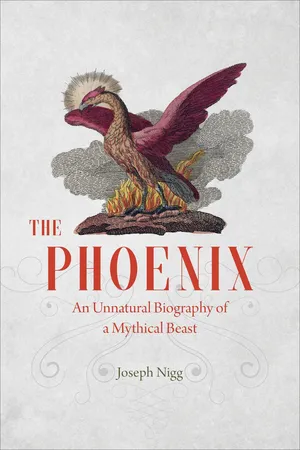
- 496 pages
- English
- ePUB (mobile friendly)
- Available on iOS & Android
About this book
An "insightful cultural history of the mythical, self-immolating bird" from Ancient Egypt to contemporary pop culture by the author of The Book of Gryphons (Library Journal). The phoenix, which rises again and again from its own ashes, has been a symbol of resilience and renewal for thousands of years. But how did this mythical bird come to play a part in cultures around the world and throughout human history? Here, mythologist Joseph Nigg presents a comprehensive biography of this legendary creature. Beginning in ancient Egypt, Nigg's sweeping narrative discusses the many myths and representations of the phoenix, including legends of the Chinese, where it was considered a sacred creature that presided over China's destiny; classical Greece and Rome, where it appears in the writings of Herodotus and Ovid; medieval Christianity, in which it came to embody the resurrection; and in Europe during the Renaissance, when it was a popular emblem of royals. Nigg examines the various phoenix traditions, the beliefs and tales associated with them, their symbolic and metaphoric use, and their appearance in religion, bestiaries, and even contemporary popular culture, in which the ageless bird of renewal is employed as a mascot and logo. "An exceptional work of scholarship."— Publishers Weekly
Frequently asked questions
- Essential is ideal for learners and professionals who enjoy exploring a wide range of subjects. Access the Essential Library with 800,000+ trusted titles and best-sellers across business, personal growth, and the humanities. Includes unlimited reading time and Standard Read Aloud voice.
- Complete: Perfect for advanced learners and researchers needing full, unrestricted access. Unlock 1.4M+ books across hundreds of subjects, including academic and specialized titles. The Complete Plan also includes advanced features like Premium Read Aloud and Research Assistant.
Please note we cannot support devices running on iOS 13 and Android 7 or earlier. Learn more about using the app.
Information
Table of contents
- Cover
- Title Page
- Copyright Page
- Dedication
- CONTENTS
- Preface
- Introduction: Cultural Transformations of the Phoenix
- Prologue: Sacred to the Sun
- Part I. Classical Marvel
- Part II. Bird of God
- Part III. Renaissance Transformations
- Part IV. Challenged and Discredited
- Part V. Modern Rebirth
- Acknowledgments
- Notes
- Selected Bibliography
- Index